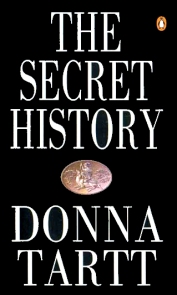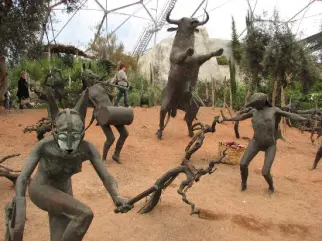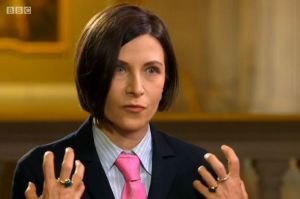The Secret History Donna Tartt
April 4, 2014 at 4:24 pm | Posted in Award winners, Middle Weight Fiction, Popular Fiction, The Secret History | 1 CommentTags: Book Clubs, book review, Book Reviews, bookclub, Bookreviews, good book reviews, Great Reads, popular fiction, recomended reads

It is understandable how Donna Tartt’s ‘The Secret History’ became a long-term bestseller and conquered a place in so many book lovers hearts. The story centered on a group of young bright affluent students at an exclusive Vermont College in the 1980’s roaming wild and burning through money is exceptionally engaging .and compulsively addictive.
The young group is composed of a variety of apparently sympathetic characters Richard who, unlike his peers, is on a scholarship to the exclusive college and is at great pains to conceal his blue-collar roots, twins Camilla and Charles known for their manners and gentle ways, Henry the emergent leader of the group remarkable for his adaptability to changes in circumstance and ability to mix easily with all sorts of people and also Francis and Bunny who enjoy all life has to offer with great self-assurance. What the characters all have in common is that they are all students of the charismatic erudite Professor Julian Morrow who teaches them Classics exclusively to a level of detail and reverence far above the academic norm.
Inspired deeply by their passionate teacher a few members of the group perform a Dionysian rite one night (a rite designed to work the worshiper into a state of ecstasy in order to feel the power of the gods through wine, dancing and often sexual expression) but the rite has truly gross consequences for the group which go on to drive the plot to even wilder and darker places and the death of Bunny Corcoran (whose death is revealed to the reader in the first line of the novel). 
Do not look for redemption, regret or guilty melancholy from this group, as a reader the novel demands that one must think much bigger when it comes to this motley crew and contemplate openly Donna Tartt’s brilliant subtle suggestions that Henry may himself be the devil incarnate and that in this existential world absolutely anything is possible once you have the nerve and stomach for it.
The plot is set in the familiar routines of college life against the rich dripping backdrop of the classical world of Greek and Latin language, prose and poetry. Donna Tartt’s prose is just so accomplished that at times it feels like God himself has lifted the telephone to call you personally and reveal some select mysteries of the world;
‘…there was never any doubt that he (Henry) did not wish to see us in our entirety, or see us, in fact, in anything other that the magnificent roles he had invented for us: genis gratus, corpore glabellus, arte multiscius, et fortuna opulentus – smooth cheeked, soft-skinned, well-educated, and rich. It was his odd blindness, I think, to all problems of a personal nature which made him able at the end to transmute even Bunny’s highly substantive troubles into spiritual ones.’
The novel in haiku; murderous thoughts fly, money and nerve conquer all, but it takes just one
A charming and skillful story
April 29, 2011 at 3:48 pm | Posted in Award winners, Great for Book Clubs, Middle Weight Fiction, The Housekeeper and The Professor | 6 Comments‘The Housekeeper and the
Professor’
Yoko Ogawa April 2009
A brilliant old mathematician lives alone in his run down two roomed house in Japan on his sister-in-law’s property. Due to an accident in 1975 he has lost his power to create new memories. He cannot remember anything for longer than eighty minutes and so still believes it is 1975. But he does remember the mathematics he studied prior to the accident and living in this abstract manner comes to be his saving grace.
A housekeeper is dispatched by her agency to work for the old man taking care of his home and meals. She is a single parent to a young boy and the trio come to share a deep and tender relationship within the limits of the old man’s disability. The tenderness and empathy the housekeeper and her son develop towards the old man quickly surpass the boundaries of their professional relationship with him and as with many a good novel there are consequences to this.
In this beautifully evocative novel empathy finds its place between each of the characters own fragility. The writing allows the plot to develop naturally and the abstract nature of number theory creates another depth to the story. The evocation of Japan and it’s food is very moving as is the story’s natural flow showing Yoko Ogawa’s skill as a writer.
This was originally published in Japan under the title The Professor’s Beloved Equation (博士の愛した数式 and sold four million copies. It is a charming jewel of a read.
Click here to reserve this book from a DLR Library
Haiku; Maths and memories, create a tender novel, all readers it will please
The prose road is the road less travelled
October 8, 2010 at 2:42 pm | Posted in Award winners, Great for Book Clubs, Literary Fiction | Leave a commentTags: Book Reviews
Howard Jacobson ‘The Finkler Question’ Bloomsbury August 2010
Howard Jacobson’s ‘The Finkler Question’ has won this year’s Man Booker Prize. However reading it didn’t change my decision to have firmly backed Damon Galgut’s ‘In a Strange Room’ for the prize although the two books are very different types of novels. What is likeable about ‘The Finkler Question’ is that it is a very dark comedy, something which is so rare in fiction and it is also a remarkable piece of prose writing whose plot allows Jacobson to explore many interesting ideas.
The book hinges itself on the dynamics of Sam Finkler’s friendships with tw o other men, Julian Tresolve a former BBC worker whose life and career appear to have suffered from his disgruntled world views and values and his inability to commit to people and long term projects and also with Libor Secivk an elderly Jewish widower. Finkler himself is a philosopher and television producer and philosophical musings are resonant in Jacobson’s writing style.
o other men, Julian Tresolve a former BBC worker whose life and career appear to have suffered from his disgruntled world views and values and his inability to commit to people and long term projects and also with Libor Secivk an elderly Jewish widower. Finkler himself is a philosopher and television producer and philosophical musings are resonant in Jacobson’s writing style.
One evening Tresolve is attacked and his pride and values are disturbed when he realises 1. his attacker is a woman and 2. when he believes she slurred the words ‘you Jew’ when robbing him of his valuables. The novel then begins to meditate on ideas of anti Semitism and the Israeli – Palestine conflict with his friend Libor taking over the narrative for a large part of the book musing what it has been like for him to be Jewish in the21st Century.
I must be honest and say I found this book to be quite difficult. The prose road in fiction for me is definitely the one less travelled in my reading. The novel’s concepts are very interesting but heavily ideological, Jacobson’s writing voice is strong but heavily philosophical and these elements compounded together to make the novel more challenging than enjoyable.
Haiuk; Ideology, heavy literary prose, study the story.
Let the great world sink
February 2, 2010 at 7:43 pm | Posted in Award winners, Literary Fiction | 1 Comment Colm McCann, ‘Let the Great World Spin’, Bloomsbury 2009
Colm McCann, ‘Let the Great World Spin’, Bloomsbury 2009
I love Bloomsbury publishers. They have published some of my favourite authors and books such as the wonderful Elizabeth Gilbert, Tobias Wolff, Amy Bloom, Hunter S. Thompson, Alexander McCall Smith and Joanna Trollope. They have broken an array of new authors and have always been amazingly discerning in their fiction lists. This is the first time they have let me down! ‘Let the Great World Spin’ is a disaster. It uses Philippe Petit’s 1974 tightrope walk between the towers of the World Trade Center as its central metaphor and recounts the story of two Irish brothers living in New York in the late 1970’s. There are a plethora of other characters introduced into the story, all with huge profound life changing experiences of prostitution, war, love and death but they simply don’t work as characters. Why? I think it is because McCann tries to include too many big ideas, for example the birth of the internet, into this story. These ideas are so big they require more detail, space and dare I say even more research into them than they are given. McCann paints a picture of a mother grieving the death of her son in the Vietnam War but the descriptions could have been of any war. The descriptions of New York give no real tangible indication that it is New York in the late seventies. There are too many characters and we don’t get a real sense of any of them. It is complicated and disjointed and the metaphor of the tightrope walker has no real place in the book. It is far too ambitious and doesn’t deliver. Jennifer Johnson’s new book ‘Truth or Fiction’ is half the size of ‘Let the Great World Spin’, has only a handful of characters and is a very simple story but evokes so much more beauty and so many more ideas by saying so much less.
National Book Award Winner 2009
Haiku; Many ideas, disconnected, were Bloomsbury thinking?
Create a free website or blog at WordPress.com.
Entries and comments feeds.

